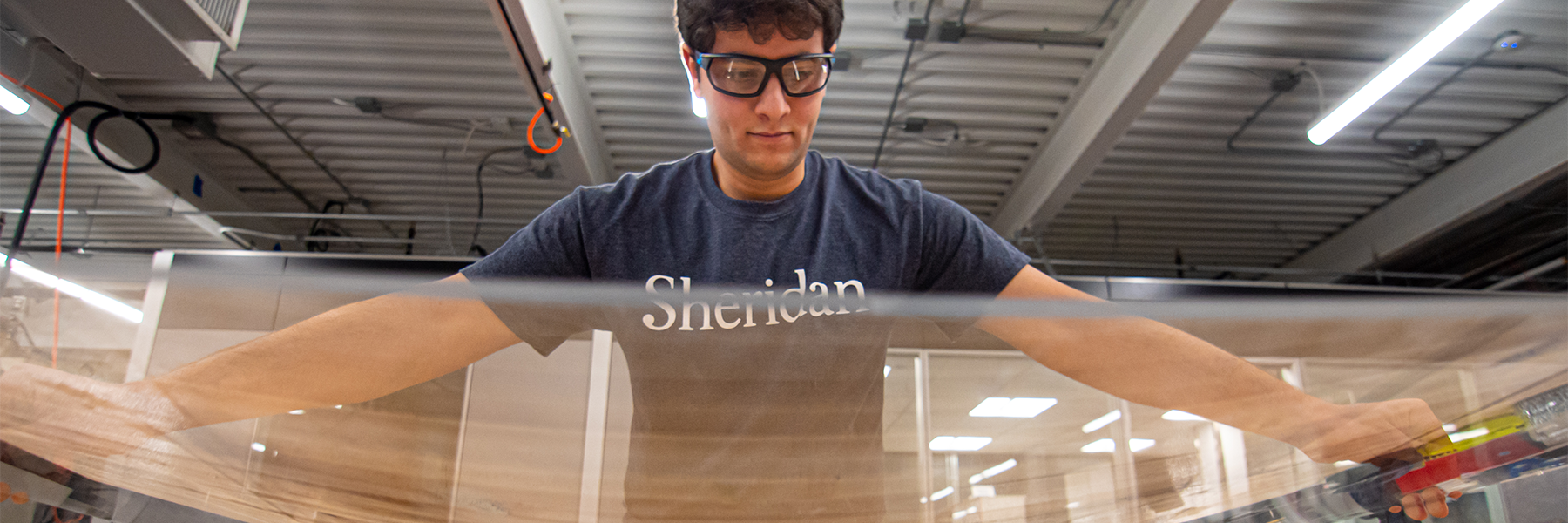Last Updated: September 10, 2020 9:34 am EDT
Small businesses are the fabric of our local communities – and Coca-Cola is taking a number of actions to support the people and families behind these businesses.
In response to the COVID-19 pandemic, Coca-Cola partnered with Sheridan College’s Centre for Advanced Manufacturing and Design Technologies (CAMDT) to produce and distribute protective countertop shields for small stores and businesses in Ontario.
These cashier shields were installed in local convenience stores and restaurants throughout the summer and will provide a protective barrier between customers and store staff. This will help business owners continue to operate while maintaining physical distancing measures.
As of September 8, 200 shields have been manufactured and delivered to various stores and restaurants across the province.
The Project: How this partnership came together
The vision for the project was born when Coca-Cola spoke to local retail and restaurant partners, and realized that a number of smaller businesses did not have protective shields or guards installed in their stores.
“The COVID-19 pandemic has been devastating for many retailers and we wanted to help businesses that may be overwhelmed trying to keep their business running,” said Ron Soreanu, Vice President of Public Affairs and Communications, Coca-Cola Ltd. “Protective barriers between the cashier and the customer will give an extra layer of confidence to everyone during their shopping experience.”
Awesome partnership between two #Brampton success stories! @BramptonEcoDev @clarebarnett137 @RonSoreanu @sheridancollege https://t.co/L5zBH2JVHb
— Patrick Brown (@patrickbrownont) June 24, 2020
Coca-Cola in Canada is represented by two businesses, Coca-Cola Ltd. and Coke Canada Bottling, who locally produces, distributes and sells a variety of Coca-Cola products across the country. Coca-Cola Ltd. invested $75,000 to fund the purchase of materials and lead the project. Coke Canada Bottling sourced the locations and stores that needed protective shields and led local distribution.
“Since the beginning of this pandemic, Coke Canada Bottling has been working in our local communities help our foodservice and retail customers during these difficult times,” said Kathy Murphy, Vice President Public Affairs and Communications at Coke Canada Bottling. “With a long-standing presence in the Brampton community, working alongside Sheridan College, was a wonderful opportunity for local businesses to come together, and make a difference”.
The Innovation: How Sheridan addressed an industry issue
Sheridan College was particularly innovative when designing the prototype behind these shields.
The college used an alternative form of plastic which is a comparable material to plexiglass; it is just as sturdy and more readily available. This new material addressed a larger problem around a shortage of plexiglass across North America, which put many businesses at risk of waiting several months before it’s available to purchase.
“Our dedicated team responded to industry needs in an agile way and put Sheridan in a position to contribute to our communities efficiently and effectively,” said Dr. Michelle Chrétien, Director of CAMDT at Sheridan College “We’re delighted to be supporting small business owners with a solution that helps facilitate safe interactions with customers.”
Sheridan also manufactured multiple designs to suit different countertop configurations for employees working at cash registers or takeout counters.
The two designs for these protective shields are openly available here.
Ontario’s Premier, Doug Ford, visited Sheridan College for a tour of the hub earlier in the Summer to see the design and manufacturing processes used in the creation of the shields.
Today, Premier @fordnation, @RossRomanoSSM & I visited @sheridancollege in #BramptonSouth.@CocaColaCo_ca and Sheridan College recently partnered up to build protective countertop shields for small businesses.
— Prabmeet Sarkaria (@PrabSarkaria) July 23, 2020
It was great to see #OntarioSpirit at work! #onpoli pic.twitter.com/yg7fnmxzry
The People: Meet the businesses who received a shield
The 200 shields were distributed to small stores, restaurants and businesses across Ontario – particularly in the Greater Toronto Area.
Dino Ari’s was the first business to receive the protective shield. He owns Dino’s Wood Burning Pizza in Etobicoke and was eager to be selected for the project.
“It’s not only important for our business, but it’s important for our economy,” Ari said. “The families of these small businesses need help. They need to put bread on their table to feed their families. COVID has impacted business owners mentally and economically.
"I feel very lucky that Coca-Cola selected us and are thinking about small businesses in the community.”
The Purpose: How Coca-Cola is responding to the COVID-19 crisis
Throughout the COVID-19 global health crisis, Coca-Cola Canada has supported a number of community relief efforts in Canada both during the initial phase of the pandemic and as the economy continues to re-open.
The company and bottler have donated 28,000 (worth nearly $300,000) cases of milk, juice, water and sparkling beverages to frontline workers, first responders, food banks and other community organizations in Canada.
Additionally, The Coca-Cola Foundation granted two organizations, Boys and Girls Clubs of Canada and Food Banks Canada, approximately $1 million each to directly support local Canadian communities.
“Even during the toughest times throughout our 120-year history in Canada, Coca-Cola has always been there, and we will continue to be there to provide relief, support and help Canadians,” Soreanu closed. “Now more than ever, we all need to come together to support our local businesses and neighbours.”
“It’s the right thing to do.”
